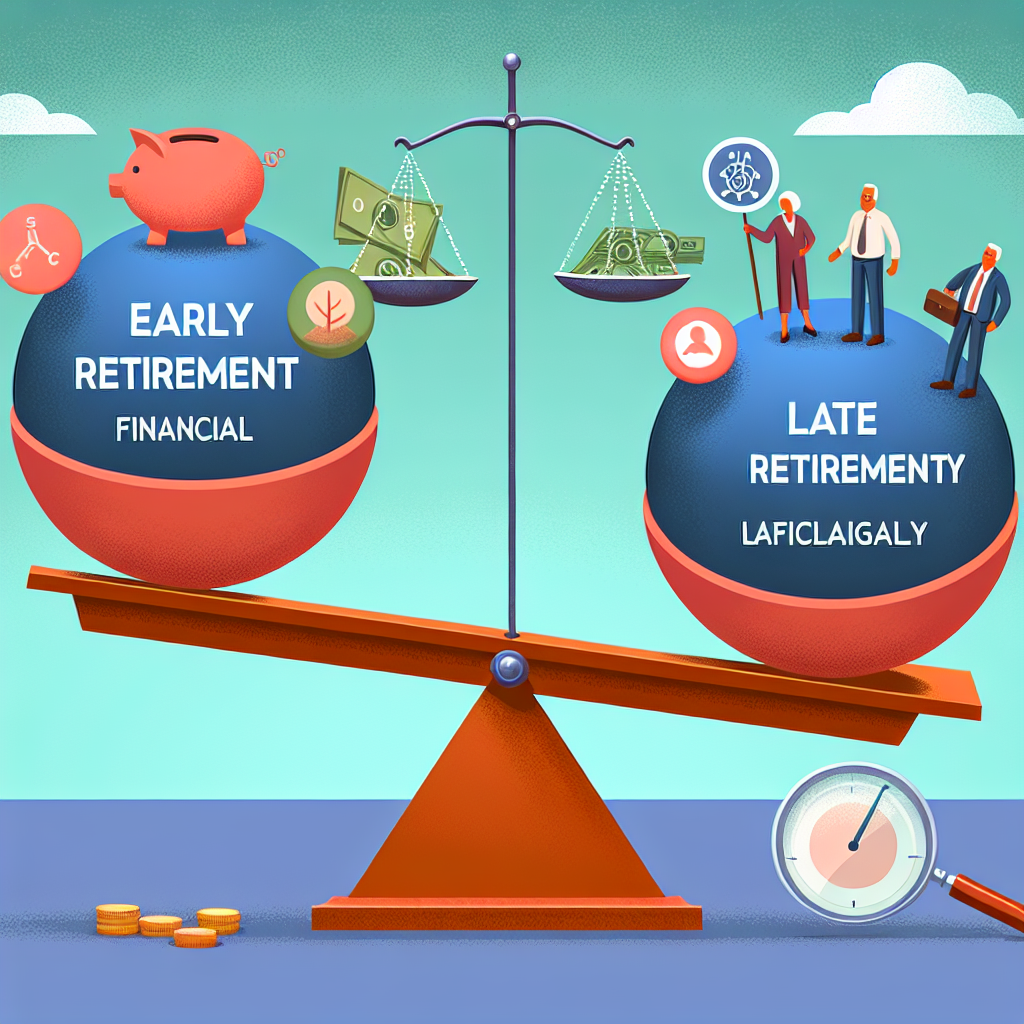Have you ever wondered what the implications are of retiring early or late? This question seems to linger in the minds of many individuals as they approach their golden years. The decision of when to retire can have a significant impact on various aspects of your life, from your financial stability to your overall well-being. In this article, we will explore the consequences and potential benefits of retiring early or choosing to work a few extra years. So, whether you’re someone who dreams of a leisurely early retirement or someone who enjoys the fulfillment of a career and is contemplating delaying retirement, join us as we uncover the potential implications of these choices.
Financial Implications
Retiring Early
Retiring early can have significant financial implications. While it may sound tempting to enjoy your golden years, it’s important to consider the impact it will have on your finances. By retiring early, you will have a longer retirement period to finance, which means you’ll need a larger nest egg to support yourself for potentially several decades. This may require careful financial planning and saving to ensure that you have enough funds to sustain your desired lifestyle.
Additionally, retiring early may mean that you’ll have a shorter period of time to contribute to your retirement savings. This could result in a lower overall retirement savings amount compared to someone who retires later. It’s crucial to evaluate your financial situation and determine if you have enough savings or other sources of income to support yourself without the need for employment.
Retiring Late
On the other hand, retiring late can also have financial implications. By continuing to work and delay retirement, you have the opportunity to accumulate more savings and potentially increase your retirement income. This can be advantageous for those who may not have been able to save enough during their working years or those who want to enjoy a more comfortable lifestyle in retirement.
Retiring late allows you to continue contributing to retirement accounts, such as 401(k)s or IRAs, and potentially take advantage of employer matching contributions. Additionally, by delaying the start of Social Security benefits, you can increase the monthly amount you receive. However, it’s important to consider your overall health and ability to continue working. While working longer can boost your finances, it’s crucial to prioritize your well-being and not overwork yourself.
Health Implications
Retiring Early
Retiring early can have positive health implications. Leaving behind the stresses of work and having more time to focus on self-care and relaxation can positively impact your overall well-being. It can provide the opportunity to adopt healthier habits, such as regular exercise, cooking nutritious meals, and getting sufficient sleep. These lifestyle changes can contribute to improved physical and mental health, reducing the risk of chronic diseases and boosting longevity.
However, early retirement can also lead to negative health implications if not managed properly. Transitioning from a structured work environment to a more relaxed lifestyle may result in a lack of purpose or a sense of boredom, which can impact mental health. It’s important to find fulfilling activities and hobbies to stay mentally and physically engaged during retirement.
Retiring Late
Retiring late may provide certain health benefits as well. By remaining in the workforce, you maintain a regular routine and social interaction, which can positively impact mental well-being and prevent feelings of isolation. The sense of purpose that work provides can contribute to overall life satisfaction and a sense of identity.
However, prolonged work commitments and increased responsibilities may also lead to higher stress levels and negatively impact health. Long working hours, high-pressure job environments, and lack of time for self-care can take a toll on physical and mental health. It’s crucial to strike a balance between work and personal well-being when considering retiring late.

Social Implications
Retiring Early
Retiring early can have various social implications. On one hand, it allows you more freedom and time to spend with family and friends. You can strengthen relationships, create lasting memories, and enjoy the company of loved ones. Furthermore, early retirement provides the opportunity to cultivate new social connections and engage in community activities that may have been difficult to participate in while working.
On the other hand, retiring early may result in a decrease in social interactions, especially if you were heavily involved in a work-related social circle. The absence of colleagues and the structured environment may lead to feelings of loneliness or isolation. It’s important to proactively seek social opportunities and maintain a supportive network to prevent social disconnection in retirement.
Retiring Late
Retiring late can also have social implications. Continuing to work affords you the opportunity to maintain social connections with colleagues and meet new people. The workplace often serves as a place for social interactions and friendships, which can be beneficial for mental well-being and overall satisfaction.
However, delaying retirement may limit the amount of time and energy you can dedicate to building and enjoying relationships outside of work. It’s essential to find a healthy work-life balance and prioritize maintaining meaningful connections beyond the professional sphere.
Emotional Implications
Retiring Early
Retiring early can have both positive and negative emotional implications. On one hand, it can bring a sense of relief and freedom from work-related stressors. You may experience a boost in overall life satisfaction, as you have the opportunity to pursue passions, hobbies, and personal interests. Early retirement allows you to prioritize self-care and focus on your emotional well-being.
On the other hand, retiring early may result in feelings of uncertainty and loss of identity. Work often provides a sense of purpose, structure, and social connections, which can be challenging to replace in retirement. It’s crucial to explore new avenues for personal growth, seek out fulfilling activities, and maintain a strong support system to navigate the emotional implications of early retirement.
Retiring Late
Retiring late may also have emotional implications. On one hand, the decision to continue working may provide a sense of fulfillment and purpose. The achievement and satisfaction that come from accomplishing work-related goals can positively impact your self-esteem and emotional well-being. It allows you to maintain a sense of identity outside of retirement.
However, postponing retirement can also lead to emotional fatigue and burnout, particularly if you’re juggling multiple responsibilities or working in a high-stress environment. It’s essential to prioritize self-care and regularly assess your emotional well-being to avoid detrimental impacts on your mental health.

Physical Implications
Retiring Early
Retiring early can have significant physical implications. It provides you with more time and flexibility to focus on your physical health. You have the opportunity to engage in regular exercise, prioritize nutritious eating habits, and manage any existing health conditions effectively. This can lead to improved physical fitness, increased energy levels, and a reduced risk of age-related ailments.
However, the lack of a structured routine and potential sedentary behavior during retirement can lead to a more inactive lifestyle, which can negatively impact your physical well-being. It’s important to establish and maintain a healthy routine that includes regular physical activity, regardless of retirement status.
Retiring Late
Retiring late can also have physical implications. While continuing to work may keep you physically active, it’s essential to strike a balance between work and self-care. Long work hours and high-stress occupations can lead to physical exhaustion and neglect of personal health. It’s crucial to prioritize self-care and implement strategies to maintain your physical well-being while navigating a late retirement.
Sense of Purpose and Identity
Retiring Early
Retiring early can significantly impact your sense of purpose and identity. Work often plays a central role in shaping one’s identity and providing a sense of fulfillment and achievement. When you retire early, you may experience a loss of identity and struggle to define your purpose outside of the workforce.
To maintain a strong sense of purpose, it’s important to explore new avenues for personal growth and engage in meaningful activities. This could include volunteering, pursuing hobbies, or starting a new venture. By actively cultivating a sense of purpose, you can navigate the emotional and psychological challenges that may arise from early retirement.
Retiring Late
Retiring late also has implications for your sense of purpose and identity. Continuing to work allows you to maintain a connection to your professional identity and a sense of accomplishment. Work can provide structure, routine, and a clear sense of purpose, which can positively impact your overall well-being.
However, it’s crucial to ensure that your identity isn’t solely reliant on your work. Exploring other aspects of your identity beyond your professional life and cultivating hobbies and interests outside of work can contribute to a more well-rounded sense of self.

Leisure and Recreation
Retiring Early
Retiring early opens up new opportunities for leisure and recreation. With more free time, you can explore your passions, travel, engage in hobbies, or pursue activities you may not have had time for while working. Early retirement provides the chance to truly enjoy your interests and invest time and energy into activities that bring you joy and fulfillment.
However, it’s important to strike a balance between leisure and maintaining a sense of purpose in retirement. Without structure and goals, excessive leisure time may lead to a lack of motivation or a feeling of aimlessness. It’s crucial to find a balance that allows for both leisure and meaningful engagement to make the most of your early retirement.
Retiring Late
Retiring late may limit the amount of time available for leisure and recreation. Being immersed in work obligations can reduce the time and energy you have to invest in hobbies, travel, or other leisure activities. It’s important to prioritize leisure activities and create a healthy work-life balance to ensure that you have time for relaxation and enjoyment.
Although retiring late may provide fewer opportunities for extensive travel or exploration, it’s essential to find ways to incorporate leisure and recreation into your schedule. This can contribute to improved mental well-being and overall life satisfaction.
Family Dynamics
Retiring Early
Retiring early can have a significant impact on family dynamics. It allows for more quality time with family members, particularly if they’re still in the workforce or school. Early retirees have the opportunity to create lasting memories, be actively involved in their children’s lives, and establish stronger relationships with family members.
However, retiring early might also lead to financial considerations within the family. It’s important to communicate openly with your loved ones about the potential financial adjustments and involve them in the decision-making process. Collaborating on financial goals and expectations can foster a supportive and understanding family dynamic during early retirement.
Retiring Late
Retiring late can also influence family dynamics. By continuing to work, you may have less time available to spend with family members, especially if they have already entered retirement. It’s crucial to find a balance between work commitments and family relationships to ensure that both are given adequate attention.
Additionally, late retirement can impact intergenerational relationships and financial support within the family. Depending on individual circumstances, retiring late may result in a longer time frame during which you can provide financial support for children or grandchildren. It’s important to consider and plan for potential family dynamics and expectations when making retirement decisions.

Work-Life Balance
Retiring Early
Retiring early has a significant impact on work-life balance. It allows you to shift the focus from work obligations to personal interests and well-being. With more time on your hands, you can prioritize self-care, spend quality time with loved ones, and engage in activities that bring you joy and fulfillment.
However, it’s crucial to establish a new work-life balance in retirement. Without the structure and routine of employment, it can be challenging to manage time effectively and avoid overindulgence in leisure activities. Creating a healthy balance between personal pursuits, family commitments, and leisure will contribute to overall life satisfaction during early retirement.
Retiring Late
Retiring late can impact work-life balance as well. By continuing to work, you may find it challenging to devote sufficient time and energy to personal interests, family, and leisure activities. Long work hours and increased responsibilities can leave minimal time for relaxation and enjoyment outside of work.
It’s important to prioritize self-care and establish boundaries to maintain a healthy work-life balance as you approach retirement. Finding ways to delegate or reduce work-related commitments can help create more time for personal pursuits and family interactions.
Impact on the Economy
Retiring Early
The decision to retire early can have an impact on the economy, both on a micro and macro scale. Early retirees may choose to reduce their spending or adjust their lifestyle to accommodate their retirement savings. This reduced consumer spending can have implications for businesses and the overall economy.
Furthermore, early retirees may opt for part-time or freelance work, leading to a change in the labor market. This can create opportunities for younger individuals entering the workforce but may also result in a loss of experience and expertise in certain industries.
Retiring Late
Retiring late also has implications for the economy. By staying in the workforce longer, older individuals contribute to economic productivity and bolster the labor market. They continue to earn and spend, supporting various industries and businesses.
Financially stable late retirees may also opt to invest their savings or engage in entrepreneurial endeavors, further stimulating economic growth. Additionally, individuals who postpone retirement often continue contributing to retirement accounts, increasing accumulated wealth and potential investment opportunities.
In conclusion, the decision to retire early or late has various implications across different aspects of life. Considerations such as financial well-being, physical and mental health, social connections, and personal fulfillment should be taken into account when making retirement decisions. It’s important to assess individual circumstances, preferences, and goals in order to make the most informed choice for a fulfilling and satisfying retirement journey.


